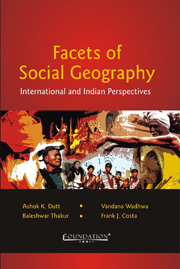Book contents
- Frontmatter
- Contents
- Foreword
- Preface
- Acknowledgements
- List of Contributors
- I Introductory Framework: Allen G. Noble's Contribution to Social Geography
- II Conceptual and Theoretical Basis of Social Geography
- III Social Geography from a Global Perspective
- 9 Regional Patterns of Spanish-Language Newspaper Publication in the United States, 1848–1992
- 10 Enterprise Zones in a Global Perspective: Socioeconomic Consequences
- 11 Multi-faceted Regional Inequality in China
- 12 Social Geography of the Minorities in Israel
- 13 Urban Sprawl and Socioeconomic Change in the Kathmandu Valley, Nepal
- 14 Ave Maria: A Planned Town in Collier County, Florida
- IV Social Geography in the Indian Context
- V Indian Social Geography: City and State Context
- Index
9 - Regional Patterns of Spanish-Language Newspaper Publication in the United States, 1848–1992
from III - Social Geography from a Global Perspective
Published online by Cambridge University Press: 05 June 2012
- Frontmatter
- Contents
- Foreword
- Preface
- Acknowledgements
- List of Contributors
- I Introductory Framework: Allen G. Noble's Contribution to Social Geography
- II Conceptual and Theoretical Basis of Social Geography
- III Social Geography from a Global Perspective
- 9 Regional Patterns of Spanish-Language Newspaper Publication in the United States, 1848–1992
- 10 Enterprise Zones in a Global Perspective: Socioeconomic Consequences
- 11 Multi-faceted Regional Inequality in China
- 12 Social Geography of the Minorities in Israel
- 13 Urban Sprawl and Socioeconomic Change in the Kathmandu Valley, Nepal
- 14 Ave Maria: A Planned Town in Collier County, Florida
- IV Social Geography in the Indian Context
- V Indian Social Geography: City and State Context
- Index
Summary
Population data from the decennial census of the United States (US) can provide a reasonable picture of the changing distribution of people of various Hispanic origins in the country during the last 150 years. Beyond simply enumerating population distributions, some census data, like home ownership and language spoken at home, do provide a sense of the degree to which Hispanics have settled permanently in particular regions and the extent to which they have maintained important cultural traditions such as language use. Thus, census data can provide an index to the permanence of Hispanic populations and to their degree of assimilation in the US. However, these data cannot illuminate the degree to which Hispanics have established institutions to maintain and to recreate Hispanic culture in the alien cultural context of the US. To gauge the extent to which Hispanics, or for that matter other immigrant groups, attempt to maintain and recreate their culture in the new cultural milieu, one must examine the extent to which they establish institutions to do so. Typically, social institutions like churches, schools and ethnic clubs fulfil this function, while ethnic-based businesses and the mass media like newspapers, radio and television often play a supplemental role in preserving and strengthening ethnic identity.
More than 50 years ago, in his book, Spanish-Speaking Groups in the United States, John Burma (1954, p. 38) predicted that the Spanish-language press in the US would disappear within 15 years.
- Type
- Chapter
- Information
- Facets of Social GeographyInternational and Indian Perspectives, pp. 169 - 184Publisher: Foundation BooksPrint publication year: 2012



